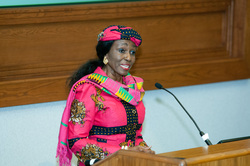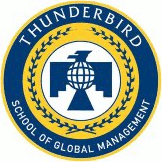
Mrs. Nana Konadu Agyeman-Rawlings, wife of former Ghanaian President Jerry Rawlings, and head of the 31st December Women’s Movement, delivered her remarks recently at the Thunderbird School of Global Management, in Glendale, Arizona (click: photo gallery).
On the topic “Development, Politics and National Government—Impact on African Women,” she recalled her work “as an African woman who has spent her last 30 years working on behalf of our nation’s women and children at the grassroots.”
“Women are 51 percent of Africa’s one billion people and they make up the majority of its poor,” she noted. “Those living in isolated rural communities are not yet part of the good news story.
“Together with children, these women often suffer the most, especially in times of crisis and unrest. For the masses of women, Africa is rising—but slowly and unevenly—and unfortunately many women are not rising with it.
"In some African countries, poverty has increased in spite of GDP growth,” she emphasized. "According to the Africa Development Bank, 61% of Africans still live below the $2 poverty line--and the majority of these people are women. So, yes, Africa is rising, but major challenges still abound: the need for inclusion and opportunity; the need for jobs; the need for equal access to healthcare and education."
Mrs. Rawlings then highlighted efforts being made to ensure that education is inclusive, that teachers are gender sensitive and curricula relevant to girls’ aspirations but warns: “Today, we take it for granted when we find African women as university professors, leading doctors in national hospitals and prominent professional businesswomen. But educational development in Africa is not impacting on women as effectively as it does on men.
“Girls are taken out of school to help in economic activities such as helping mothers sell in the market or work on farms. Marrying girls off at an early age is still a common practice.
"Even when women were able to advance beyond the sixth year in school, in many African countries including Ghana, old practices restricted the advancement of women.
"In addition to these restrictions, the traditional beliefs that certain professions are not for women persist so that in spite of all the progress made, most women are discouraged from entering into higher institutions for engineering, medicine and science and mathematics related disciplines.
“As the continent becomes more prosperous and more attractive to the outside world, our challenge—and the challenge of our national governments—is to address continuing inequality so that all Africans, including those living in isolated rural communities, fragile states and poor urban areas, are able to benefit from economic prosperity.
“It is up to us, the women of Africa, to share the responsibility for actions needed to end poverty—first in our homes, then in our communities and, ultimately, throughout our nations, one woman at a time.”
Twitter: http://twitter.com/Erika_Amoako
LinkedIn: http://www.linkedin.com/pub/erika-amoako-agyei/4/882/4a6
Facebook: Africa Business Review Face Page
Facebook: http://www.facebook.com/AfricaBusinessReview
Website: www. AfricaBusinessReview.net
Website: www.AfricaIntercultural.com
